What if Putin Doesn’t Want Peace?
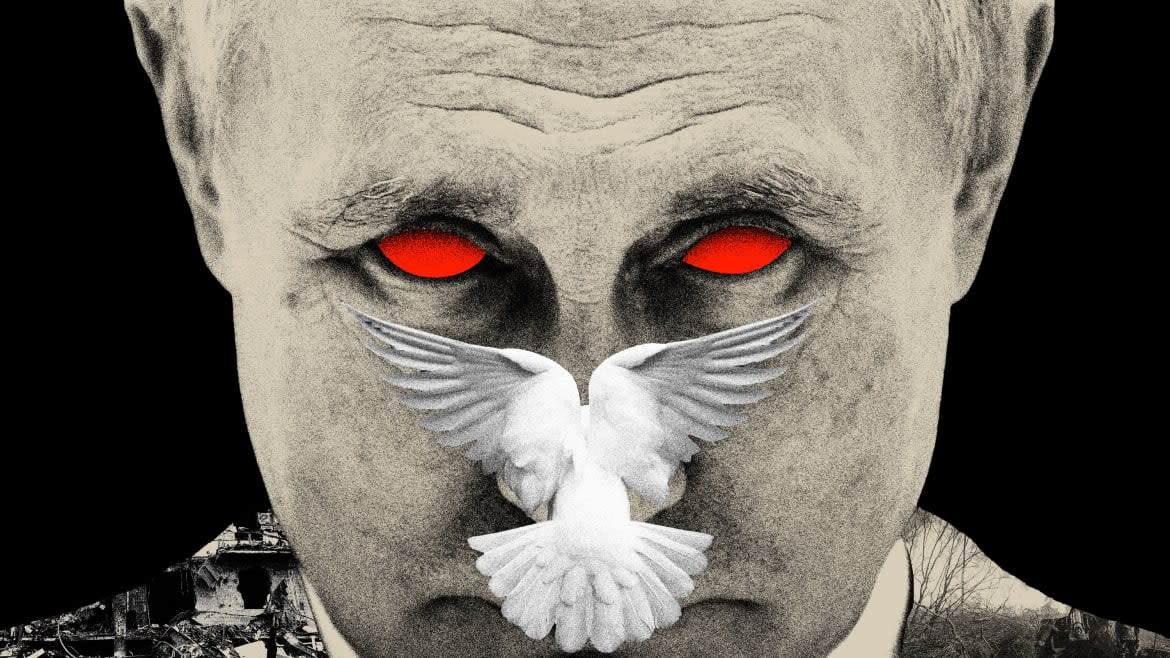
- Oops!Something went wrong.Please try again later.
- Oops!Something went wrong.Please try again later.
As the Ukraine war rages for a third year, with casualties well into the hundreds of thousands, some Americans argue that the United States should pursue peace via negotiations, instead of helping Ukraine fight off Russia’s invasion.
It’s a common position among the Republican Party’s dominant MAGA wing—for example, Rep. Eli Crane (R-AZ) argued that military aid for Ukraine “should be totally off the table and replaced with a push for peace talks”—as well as the “anti-war” left, and some self-styled “realists.”
Pope Francis Urges Ukraine to Have ‘Courage of the White Flag’ in Peace Talks
The underlying logic is that American support makes the Ukrainians overconfident—including in 2023’s costly and largely unsuccessful counteroffensive—and the U.S. doesn’t mind sacrificing an indefinite number of Ukrainians to hurt Russia. Therefore, weakening Ukraine by withdrawing aid would encourage them to pursue reasonable accommodation. In this vision, Ukraine concedes land Russia currently controls and formally promises never to join NATO, the U.S. guarantees it, and the violence finally ends.
In The Nation, Adolph Reed, Jr. says he’s “outraged at Biden’s adventurist bellicosity in Eastern Europe” with “rhetoric to stoke hostilities between Russia and Ukraine,” and claims the United States “seems hell-bent on fighting to the last Ukrainian.”
Reed doesn’t try to explain how the U.S. supposedly tricked or forced Russia into massing 190,000 troops and invading in 2022, nor tricked Ukraine into resisting Russia’s assault when they supposedly want to surrender. He assumes that Russia wants peace, the United States wants war, and Ukraine has no agency, so war it is.
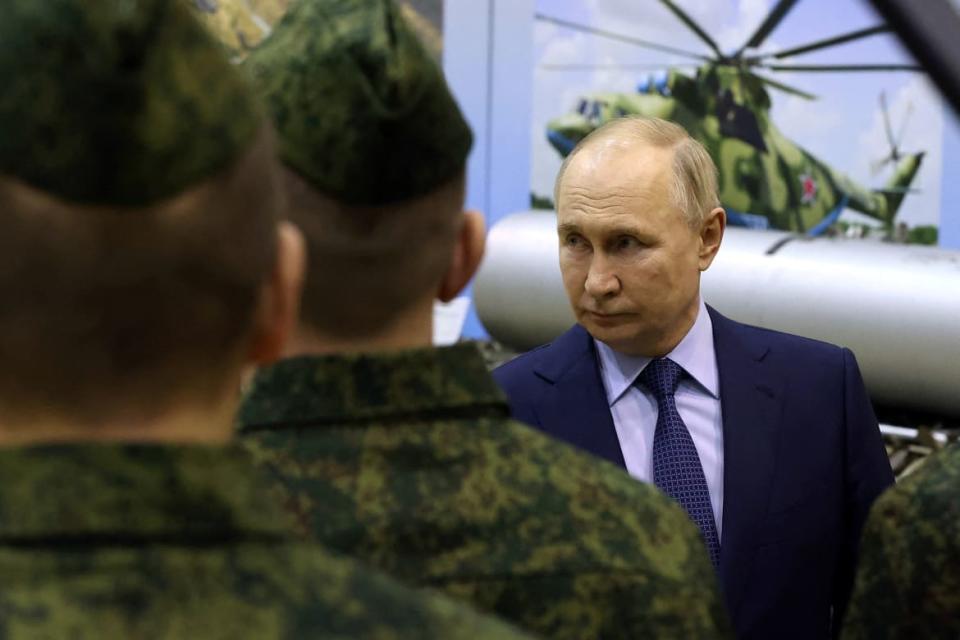
Russian President Vladimir Putin talks to military pilots in Torzhok, Russia on March 27, 2024.
Arguing in Foreign Affairs that the West should “pave the way for diplomacy to end the war in Ukraine,” Samuel Charap and Jeremy Shapiro acknowledge Russian and Ukrainian agency, but like Reed, assume Vladimir Putin wants peace. “Kyiv and Moscow have more opportunities for signaling, because they are the belligerents,” they write, so “Russia should indicate that its war aims are limited, that it is prepared to negotiate an end to the war, and that it will abide by the terms of a settlement.”
But what if Russia’s war aims are expansive, it’s not prepared to negotiate, and if it got concessions now, it’d violate the settlement when ready to try for more, much as the 2022 invasion violated previous agreements? Charap and Shapiro don’t say.
Some world leaders, such as Brazilian President Lula da Silva, have gone further, calling for negotiations now, and chastising Ukraine for wanting too much. Pope Francis stirred controversy in March when he told Ukraine to “have the courage to raise the white flag.”
But while the Trumpist right appears driven by a desire to see Russia succeed, even the well-intentioned calls to cut off Ukraine aid in the hope it leads to a negotiated settlement rely on a very dubious assumption: that Russian leader Putin wants peace.
Putin Is After Conquest
Most people like peace. They might be willing to fight in self-defense, but generally think the death and destruction of war is bad and want it to stop.
Putin is not like that. His words and actions indicate he prefers pursuit of domination over peace, and thinks his tolerance for the suffering of war is an asset against more peace-minded adversaries. Russia launched its full-scale attack on Ukraine over two years ago for basically the same reason Russia launched military action against Ukraine in 2014 and Georgia in 2008: because Putin wants to and can.
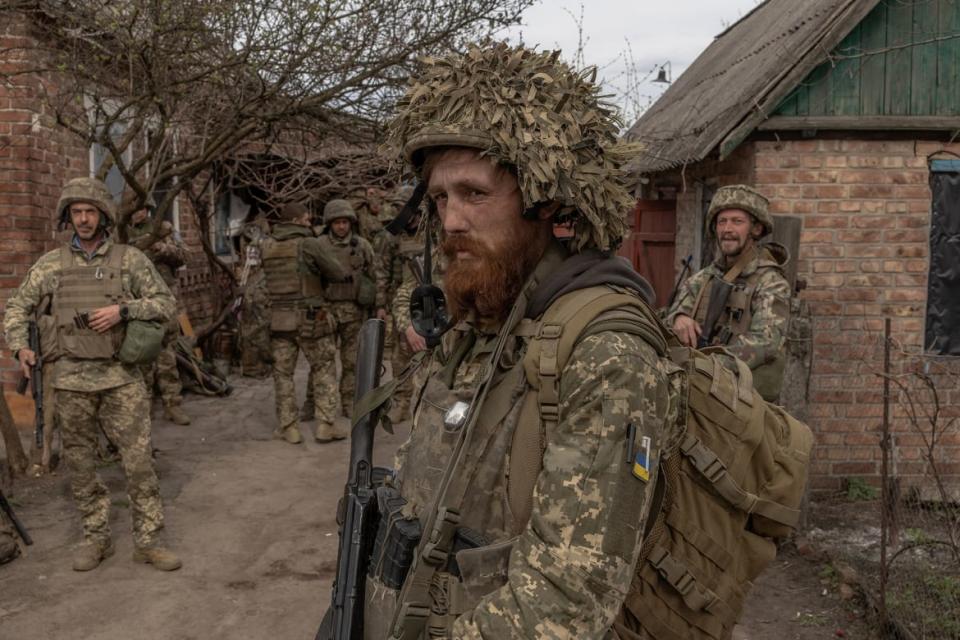
Ukrainian infantry soldiers of the 23rd Mechanized Brigade wait to head toward the frontline in the Donetsk region, on April 3, 2024.
Putin’s Russia has repeatedly shown that by “we’re open to negotiation” they mean “we’ll accept your surrender now.” Government officials and state media figures insist Ukraine “is not a real country” and should not exist. In March 2024, former Russian president and current deputy chair of Russia’s Security Council Dmitry Medvedev declared that “Ukraine is definitely Russia,” and displayed a map of Eastern Europe depicting a larger Russia, with Poland and Romania’s borders changed as well.
It’s possible all this is an elaborate, sustained, collective posturing to generate leverage for negotiations. But if so, it’s awfully consistent, and they’ve maintained it across numerous public and leaked private channels for over two years under global scrutiny. More likely, it’s an expression of intent.
That means Russia’s reaction to Ukraine weakening—due in large part to the loss of American support—is not “oh thank God, that means we’re safe, we can stop this awful war now,” but something more like “see, I told you they’re weak, now’s the time to push harder, they’ll break.”
In a recent interview, Putin himself confirmed as much, saying, “It would be ridiculous for us to start negotiating with Ukraine just because it’s running out of ammunition.”
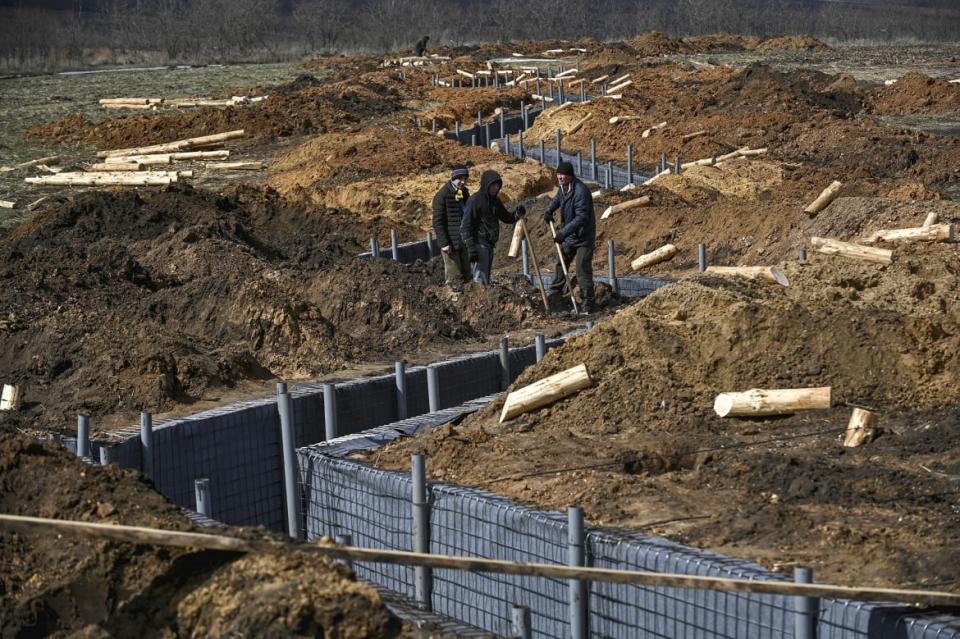
Contractors work with the military to construct state-of-the-art shelters in the Zaporizhzhia region, southeastern Ukraine, on March 24, 2024.
Ukraine Doesn’t Want to Surrender
Ukrainians are human beings with agency. Ukraine is an independent state with an elected government. It might seem absurd to say something so obvious, but some prominent arguments against aid treat Ukraine as a Western vassal, forced to fight at foreign masters’ bidding.
For example, in one conspiracy theory, Ukraine and Russia were on the verge of a peace deal in spring 2022, except then-U.K. Prime Minister Boris Johnson told Ukraine not to.
Like many conspiracy theories, it requires leaps of logic. How did Johnson have the power to make a country that had been fighting off Russian invasion for two months—eight years, really, since Russia took Crimea and fomented war in Donbas in 2014—to keep fighting when they wanted to quit?
In reality, Ukraine had just thwarted Russia’s initial thrust to take the capital, Kyiv, and uncovered torture, rape, and murder in the town of Bucha after Russian forces withdrew. In those 2022 talks, Russia rejected further withdrawal and demanded big concessions, Ukraine didn’t want to subject millions of Ukrainians to Russian occupation like in Bucha, and the talks went nowhere due to incompatible demands.
Elon Musk’s Ukraine ‘Peace Plan’ Is Asinine
Accepting that Putin wants to dominate Ukraine, and that Ukraine wants to resist, means that even a weakened Ukraine with less foreign support is unlikely to surrender. If Putin achieves his original goal of regime change in Ukraine, that probably won’t end the war—as Americans should know from Iraq.
If Putin takes a deal that leaves the Ukrainian government and military in place, it will likely be unstable, with Russia reconsolidating to try for more later, and Ukraine preparing to counter it. That describes the situation for a decade now, and into the indefinite future.
And even that sort of deal appears out of reach, with Russia and Ukraine both demanding significantly more (in opposite directions).
Russia isn’t expressing openness to any real peace deal. And to the extent they do, Ukrainians don’t trust Putin’s word. No negotiated agreement since 2014 stopped Russian aggression—not entirely, or not for long.
Military Realities
Underlying some calls for Ukraine to sue for peace is a misunderstanding of the state of combat. After large swaths of territory changed hands in 2022, the front line barely moved in 2023, leading some to call it a stalemate. But the line was very active, with Russia alone suffering about a quarter million casualties last year.
The U.S. Government Can’t Allow Elon Musk the Power to Intervene in Wars
Then in 2024, Russia managed to break that not-actually-a-stalemate. As Ukraine faces ammunition shortages, in part due to U.S. aid drying up months ago, Russia has taken advantage, pressing up and down the line. In February this year, Ukraine withdrew from the eastern city of Avdiivka, Russia’s first territorial gain since spring 2023.
Despite increasingly desperate requests, Congress hasn’t passed any aid for Ukraine in over a year. The Senate passed a bill two months ago by a vote of 70-29, but Republican Speaker of the House Mike Johnson has refused to bring that or any alternative to the floor (likely because he knows it’s popular and would pass with bipartisan support). Ukraine is notably weaker as a result, but there are no signs they’re more inclined to surrender.
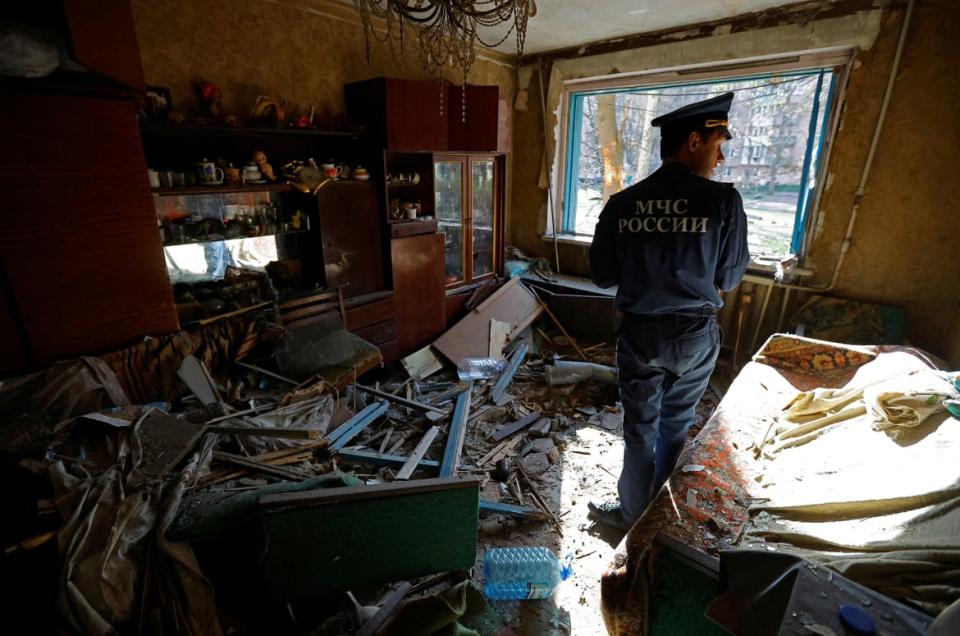
A member of Russia’s emergencies ministry inspects a damaged flat inside an apartment building hit by recent shelling, in Donetsk, Russian-controlled Ukraine, on April 4, 2024.
Meanwhile, Russia has reacted to Ukrainian weakness not by seeking a negotiated settlement, but by pushing harder, throwing bodies at the front and bombs at Ukrainian cities. Putin, other top Russian officials, and Russian state media are sounding confident and aggressive, reiterating that Russia aims to dominate Ukraine, and that they expect the weak-willed West to fold.
As military analyst Michael Kofman notes, Russia has geared up for a long war, now devoting approximately 8 percent of GDP to defense.
If cutting off military aid would incentivize both Ukraine and Russia to seek peace, we’d probably see signs of it by now. But we’re seeing the opposite.
Waiting for the 2024 U.S. Election
One of the biggest factors in the Ukraine war this year is the upcoming American presidential election, because there is a realistic possibility that the U.S. will switch sides.
Current president and Democratic nominee Joe Biden supports Ukraine and democracy more generally. Biden told America’s NATO allies in Europe that he’ll back Ukraine for “as long as it takes,” and calls on Congress to pass more aid.
By contrast, former president and current Republican nominee Donald Trump expresses sympathy for Russia and Putin’s model of authoritarian leadership. When Russia invaded Ukraine in 2022, Trump publicly gushed that the move was “savvy” and “genius.” He urged Republicans in Congress to block Ukraine aid even after they’d won concessions on U.S. border security.
If Trump becomes president again, it’s apparent that his plan for the war is to push Ukraine to give Russia what Putin wants. Trump openly advocates Ukraine ceding territory to Russia, including land the Russian military hasn’t been able to take and hold.
Donald Trump’s Pathetic and Dangerous Foreign Policy Reboot
Going further, Trump says that if Russia threatened a NATO ally, he would encourage Russia “to do whatever the hell they want” if the NATO country “didn’t pay,” misguidedly treating the NATO alliance like a protection racket rather than a mutual defense pact.
The Russian government can see all this, and surely believes they’d get a more favorable settlement in Ukraine with Trump in the White House rather than Biden. And since Putin doesn’t see the death and destruction as inherently bad—something to stop for the sake of sparing lives on both sides—he’ll continue the war through 2024 no matter what.
That means peace isn’t an option this year, even if Westerners wish to see it. The choice facing the United States in Ukraine is not between peace and war, but between a weakened Ukraine pushed back by Russia and a well-equipped Ukraine defying Russia.
And that, like so much else, is on the ballot this November.
Get the Daily Beast's biggest scoops and scandals delivered right to your inbox. Sign up now.
Stay informed and gain unlimited access to the Daily Beast's unmatched reporting. Subscribe now.

